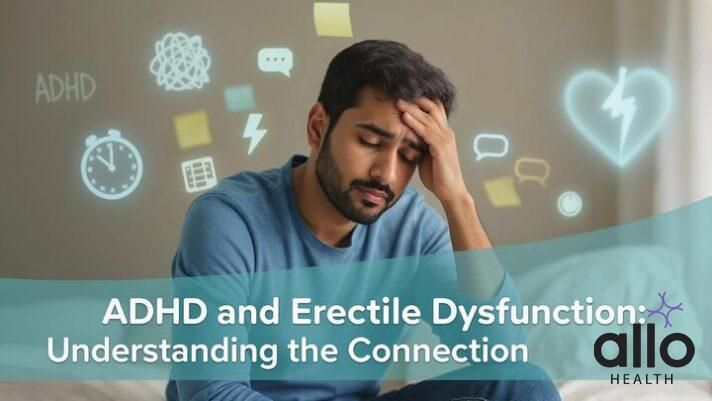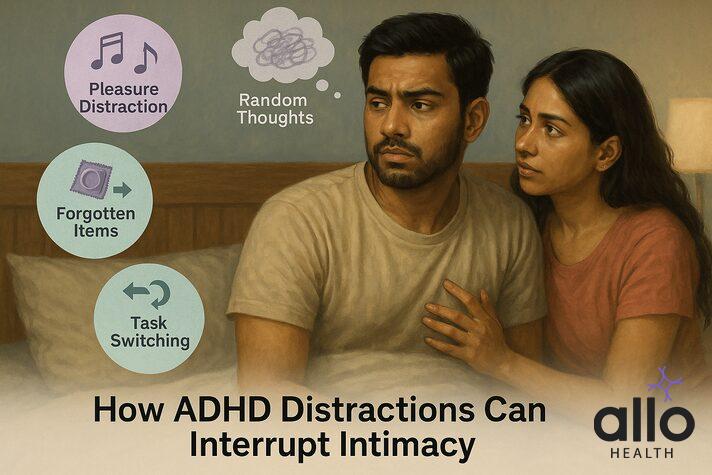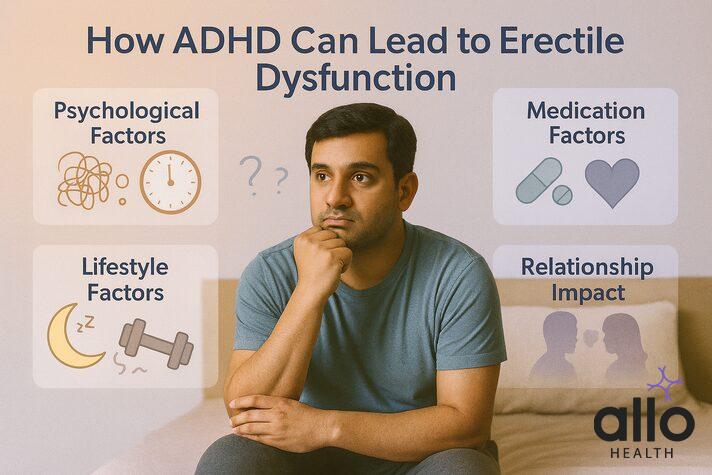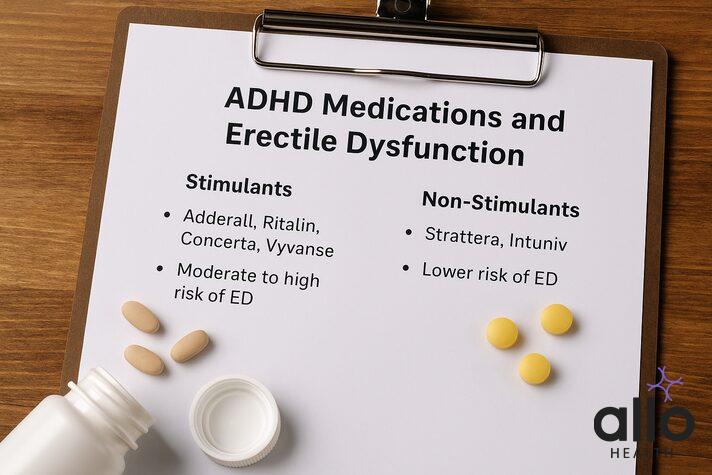ADHD and Erectile Dysfunction: Effects and The Link Between
Written by Dr. Deepali Anand

Dr. Deepali is a medical writer and healthcare professional with a background in clinical surgery and patient care. Having transitioned from active clinical practice to medical communications, she specializes in bridging the gap between complex clinical data and patient education. Dr. Deepali is dedicated to creating evidence-based content that is grounded in scientific rigor and empathy, ensuring that sensitive topics like sexual wellness and mental health are accessible and empowering for every reader.
•
August 18, 2025
Our experts continually monitor the health and wellness space, and we update our articles when new information becomes available.

Quick Read
ADHD and erectile dysfunction are connected, though ADHD doesn't directly cause ED – instead, ADHD symptoms like difficulty focusing, distractibility, and emotional regulation challenges can interfere with sexual arousal and performance. ADHD medications, particularly stimulants like Adderall and Ritalin, can also contribute to erectile difficulties, especially at higher doses. These issues are highly treatable through a combination of medical treatments (like Viagra or Cialis), ADHD medication adjustments, therapy, lifestyle changes, and mindfulness techniques. Most importantly, you don't have to choose between managing your ADHD effectively and having a satisfying sex life – with the right approach and open communication with your healthcare provider, both conditions can be successfully managed together.
If you’ve ever wondered whether there’s a connection between ADHD and erectile dysfunction, the short answer is yes. ADHD itself doesn’t directly cause ED, but the focus issues, emotional ups and downs, stress, and even certain medications used to manage ADHD can all make it harder to get or keep an erection. The good news is that both conditions are treatable.
In this article, we’ll explain how ADHD can affect sexual health, why ED is more common in men with ADHD, and the practical steps, from medical treatments to lifestyle changes, that can help you regain confidence and intimacy.

What is ADHD, and How Does it Affect Sexual Health?
ADHD, or Attention-Deficit/Hyperactivity Disorder, is a neurodevelopmental condition that affects at least 5% of adults. Symptoms of ADHD can include impulsivity, difficulty focusing, forgetfulness, and other challenges.
These very same symptoms can significantly impact sexual health[1]. Struggling to focus, getting easily distracted, or having difficulty managing emotions, can naturally affect sexual function, including arousal, orgasm, and erection quality.
Some people with ADHD experience hypersexuality; their sex drive feels constantly high. While others find themselves on the opposite end, where even thinking about sex feels exhausting or overwhelming.
The challenge often comes down to focus. Sex requires a certain level of present-moment awareness, and when the brain is constantly jumping from thought to thought, staying engaged during intimate moments can be difficult, leading to low sexual satisfaction.
Having ADHD doesn’t automatically mean you’ll struggle with erection, but the focus issues, stress, and even some of the medications can make it harder. The good news is, once we identify the cause, there are effective ways to manage both ADHD and sexual health together.
The Connection Between ADHD and Erectile Dysfunction
So, is there a link between ADHD and erectile dysfunction? The short answer is yes, but it's not quite as straightforward.
ADHD doesn't directly cause erectile dysfunction, but the effects of ADHD symptoms can lead to ED. Research[2] shows that people with ADHD have higher rates of sexual dysfunction, including erectile dysfunction.
During sex, someone with ADHD might:
• Have trouble maintaining focus on pleasurable sensations
• Get distracted by random thoughts or environmental stimuli
• Struggle to stay present with their partner or follow through on requests
• Lose track of important items like condoms or lubricants
• Lose momentum during transitions (like changing positions or putting on protection)
Managing ADHD can be mentally exhausting, leaving little to no desire for sex. Additionally, some people with ADHD experience sensory sensitivities, meaning the smells, textures, or sounds that come with sex might feel overwhelming rather than pleasurable.
Let's dig deeper into why this happens and what you can do about it.
Allo asks
Which factor do you think plays the biggest role in the link between ADHD and erectile dysfunction?

4 Ways How ADHD Can Contribute to Impotence
ADHD and erectile dysfunction are linked through several pathways. Understanding them makes it easier to manage both conditions.
1. Psychological Factors
-
Focus & Attention:
Staying present is important for arousal. With ADHD, the mind often drifts to stress or random thoughts, breaking the mood and erection.
Worrying about ED happening again can create a cycle of more distraction and stress.
-
Emotional Ups & Downs:
Irritability, overwhelm, or frustration make it harder to relax and enjoy intimacy.
-
Self-Esteem Issues:
Daily struggles with ADHD can lower confidence, which often disrupts sex and erection.
2. Medication Factors
-
Stimulant Medications (Adderall, Ritalin, Vyvanse):
It affects brain chemicals (neurotransmitter dopamine) linked to sex. They may boost libido in some, but reduce erection quality in others. Rarely, they can cause priapism (a painful, prolonged erection).
-
Non-Stimulant Medications (Strattera):
It can lower libido or make orgasm harder, causing sex issues.
-
Antidepressants (SSRIs):
Commonly used with ADHD, but can blunt desire and interfere with erections or orgasm.
3. Lifestyle Factors
-
Sleep Issues:
Poor sleep lowers testosterone and energy, directly hurting sexual performance.
-
Chronic Stress:
ADHD-related stress raises cortisol, the stress hormone, which in turn lowers testosterone and blood flow.
-
Irregular Habits:
Skipped meals, lack of exercise, and messy routines can all reduce sexual health.
4. Relationship Impact
-
Communication Gaps:
Difficulty expressing needs or failing to notice a partner’s cues can weaken intimacy in a romantic relationship.
-
Distractibility in Sex:
Partners may feel ignored, creating distance in a romantic relationship.
-
Relationship Stress:
ADHD challenges can strain bonds, making sexual connection harder.

The Role of ADHD Medications in Erectile Dysfunction
ADHD medications can sometimes affect sexual health, and it’s more common than many realize.
Stimulant Medications
- Drugs like Adderall, Ritalin, Concerta, and Vyvanse have a moderate to high risk of causing erectile dysfunction.
- Studies[3] show men on stimulants are more likely to experience ED than those on non-stimulants or no medication.
- Stimulants alter dopamine and norepinephrine, chemicals that affect arousal and blood flow.
- Side effects are dose-dependent: higher doses and longer use increase risk.
- Some men notice a boost in libido, but many find erections harder to achieve or maintain.
Non-Stimulant Medications
- Options like Strattera (atomoxetine) and Intuniv (guanfacine) carry a lower risk.
- Sexual side effects can still happen, such as mild ED, reduced desire, or delayed ejaculation, but usually less severe and often temporary.
The Good News
- Most side effects are reversible. Many men notice improvement within weeks after adjusting the dose or switching medication.
- Never make changes on your own. Always work with your doctor; they can adjust treatment, explore alternatives, or safely add ED medications if needed.

How to Manage ED With ADHD
The good news is that ADHD-related erectile dysfunction[4] ismtreatable. With the right combination of approaches, most men see significant improvement in their sexual function.
1. Medical Treatments
PDE5 Inhibitors:
Medications like Viagra (sildenafil), Cialis (tadalafil), and Levitra work well for many men with ADHD-related ED. These drugs help improve blood flow to the penis regardless of the underlying cause.
The key is working with your doctor to ensure they won't interact with your ADHD medications or any other prescriptions you're taking.
ADHD Medication Adjustments:
Your doctor might suggest lowering your stimulant dose, switching to a non-stimulant option, or timing your medication differently.
Many men find that even small adjustments can make a big difference in sexual function while still managing ADHD symptoms effectively.
2. Therapy and Counseling
Cognitive Behavioral Therapy (CBT):
CBT is incredibly helpful for breaking the cycle of performance anxiety that often develops alongside ED.
CBT teaches you practical skills for managing anxious thoughts and staying present during intimate moments.
A specialized sex therapist can help you and your partner develop strategies specifically tailored to ADHD-related sexual challenges.
They understand how attention and focus issues impact intimacy and can offer concrete techniques for improvement.
3. Lifestyle Changes
Sleep Optimization:
Since poor sleep directly impacts testosterone and sexual function, prioritizing consistent, quality sleep is crucial.
This might mean establishing a bedtime routine, limiting screens before bed, or addressing any sleep disorders.
Regular Exercise:
Physical activity improves blood flow, reduces stress, and can help manage ADHD symptoms naturally. Even moderate exercise like walking or swimming can make a noticeable difference.
Stress Management:
Chronic stress is a major contributor to both ADHD symptoms and erectile dysfunction. Finding healthy ways to manage stress, through meditation, hobbies, or relaxation techniques, can benefit sexual health.
4. Mindfulness and Focus Strategies
Present-Moment Awareness:
Practice techniques that help you stay focused on physical sensations during intimacy. This might include deep breathing, body scanning, or simply reminding yourself to return attention to pleasure when your mind wanders.
Sensory Management:
If you experience sensory sensitivities, work with your partner to create an environment that feels comfortable, adjusting lighting, temperature, or reducing distracting sounds.
Communication:
Open, honest conversations with your partner about how ADHD affects you sexually can reduce misunderstandings and create more supportive intimacy.
The Bottom Line
ADHD and erectile dysfunction are linked, as symptoms of ADHD can interfere with and hamper your sex life. The most important thing to remember is that you don't have to choose between managing your ADHD and having a satisfying sex life. With patience, the right treatment approach, and good communication with both your healthcare provider and partner, you can find effective solutions that work for you.
Disclaimer
The following blog article provides general information and insights on various topics. However, it is important to note that the information presented is not intended as professional advice in any specific field or area. The content of this blog is for general educational and informational purposes only. The content should not be interpreted as endorsement, recommendation, or guarantee of any product, service, or information mentioned. Readers are solely responsible for the decisions and actions they take based on the information provided in this blog. It is essential to exercise individual judgment, critical thinking, and personal responsibility when applying or implementing any information or suggestions discussed in the blog.
Most Asked Questions
Can ADHD make it difficult to stay hard?
Yes, it can. Trouble focusing, racing thoughts, and anxiety linked to ADHD can interrupt arousal and make erections harder to maintain. The good news is, with the right treatment plan and lifestyle support, this issue can often be improved.
Do men with ADHD have low testosterone?
Not necessarily. ADHD itself doesn’t directly cause low testosterone. But, poor sleep, chronic stress, and certain medications used for ADHD can lower testosterone levels, which may affect sexual health. A simple blood test can confirm levels if you’re concerned.
Do ADHD medications cause erectile dysfunction?
Some stimulant medications (like Adderall or Ritalin) can increase the risk of ED, while non-stimulant options usually carry a lower risk. If you notice changes in your sexual function after starting medication, talk to your doctor; adjustments or alternatives are often available.
Is erectile dysfunction more common in people with ADHD?
Research shows men with ADHD are more likely to report sexual difficulties, including ED, compared to the general population. This is due to a mix of psychological factors, medication effects, and lifestyle challenges. Knowing this connection makes it easier to seek solutions.
What can I do if I have both ADHD and erectile dysfunction?
Start by discussing it openly with your doctor. They may adjust your ADHD treatment, suggest ED medications, or recommend therapy. At home, better sleep, exercise, stress management, and open communication with your partner can all make a big difference.
Sources
- 1.
Distressing Problems with Sexual Function and Symptoms of Attention-Deficit/Hyperactivity Disorder
- 2.
Prevalence of sexual dysfunctions and other sexual disorders in adults with attention-deficit/hyperactivity disorder compared to the general population
- 3.
The Impact of Methylphenidate on Sexual Functions: A Systematic Review of Benefits and Risks
- 4.
Sexual Function, Sexual Dysfunctions, and ADHD: A Systematic Literature Review


